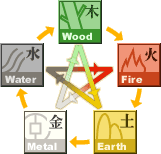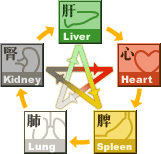How TCM Kidneys Affect Other Organs
In traditional Chinese medicine (TCM), the kidneys are the most important organs of the body; they are viewed as the root of life activities and the origin of our congenital (inherited) foundation. The TCM understanding of the kidneys is more extensive than the Western anatomical kidneys. They perform reproductive, urinary, endocrine, skeletal, blood, and central nervous functions as well as store primordial yin and primordial yang (known as the inherited kidney yin and kidney yang). The kidneys work closely with the other "zang or fu organs" to carry out physiological functions. The kidneys' relationships with the other organs are ones of mutual generation and restriction with states of constant motion and change. TCM uses the five elements theory as a tool for analyzing the phenomena, to explain the physiology and pathology of the organs and to guide clinical diagnosis and treatment.
 |
 |
| The cycle shows how the five elements restrict and generate one another. |
The cycle shows how the five zang organs restrict and generate one another. |
| |
|
 |
Generates |
 |
Restricts |
|
|
|